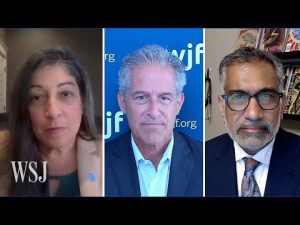**The Rise of a Socialist Star: A Closer Look at Mamdani’s Quest for New York City’s Mayorship**
In New York City, where the skyline is as iconic as the pizza slices served on every street corner, the political landscape is as vibrant as the city itself. Yet, the latest contender for the mayoral throne has sparked a debate hotter than a subway car in July. Enter Mamdani, a figure who paints himself as a man of the people, but whose background tells a different story. Born to privilege, with connections to academia and media, his claims of struggle seem to ring hollow against the backdrop of his cushy upbringing.
Mamdani’s childhood was hardly a battle for survival. With an esteemed father and a celebrated filmmaker mother, he stepped into a world where many New Yorkers would merely dream of existence. From Uganda to Cape Town and ultimately to the hallowed halls of Columbia University, his origins are the opposite of the gritty narrative he tries to sell. He attended an elite elementary school that costs more per year than most New Yorkers pay in rent, setting the stage for a life far removed from the struggles of the average city resident. This is not to mention his graduation from the Bronx High School of Science, one of the top public schools in the nation, and Bowdoin College, where he majored in African studies amidst luxurious surroundings.
After his collegiate adventures, Mamdani dabbled in careers as if flipping through channels on television. From rapping to community organizing — sound familiar, anyone? — his resume reads like an audition reel for a role in a political drama. His rise to fame came courtesy of the Democratic Socialists of America, riding the wave of leftist ideology that has captivated many young minds. He harnessed social media as if it were a magic wand, creating viral moments that often overshadow his substantial experience, or lack thereof. While he may have charm, critics claim he lacks the ability to build lasting solutions for the issues plaguing New Yorkers.
As the Democratic party leans further left, Mamdani’s platform reflects this shift, promising a utopia of socialism garnished with a sprinkle of community safety. His ambitions include free transportation, rent freezes, and even city-run grocery stores. However, the feasibility of these plans raises eyebrows. Some wonder if he is aiming to be the Robin Hood of this generation, though ironically, rather than helping the less fortunate, he seems focused on redistributing wealth among the already-haves. His ambitious dreams face reality checks, with punishing tax plans targeting corporations and billionaires that may leave New York City businesses taking their marbles and heading to more tax-friendly states.
Moreover, lurking beneath Mamdani’s friendly exterior lies a concerning ideology that intertwines socialism with other less favorable beliefs. His ties to the anti-Israel movement have many worried about his commitment to New York’s Jewish community. Co-founding a group on campus that promotes awareness of Palestinian rights, his perspectives on Israel and Hamas after recent conflicts have raised serious questions about where his loyalties lie. When the city’s Jewish population is the largest outside of Israel, his rhetoric poses a potential threat to the safety of a community that has historically faced hostility.
Thus, as New Yorkers prepare to cast their votes, they face a momentous decision: follow the charming rhetoric of a man who claims to relate to the struggles of the everyday citizen, or scrutinize the policies of a candidate whose ideas could either uplift or upend the city as we know it. With Mamdani poised to lead and a party ready to embrace his vision, the stakes have never been higher. Some see him as a breath of fresh air, while others view him as a harbinger of socialist policies that have historically hindered rather than helped. As the election approaches, New Yorkers must navigate this complex landscape, keeping their eyes peeled for what lies ahead in the land of opportunity.







